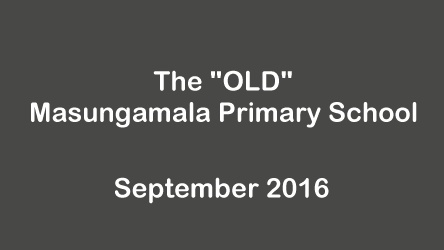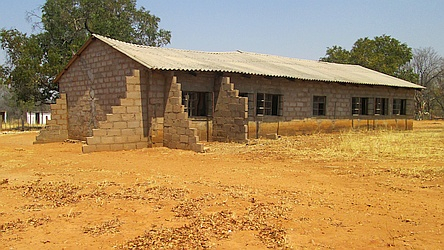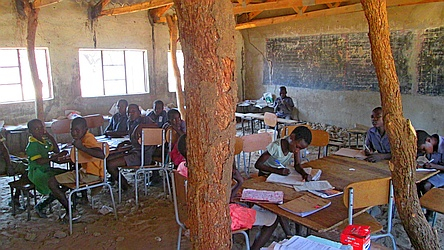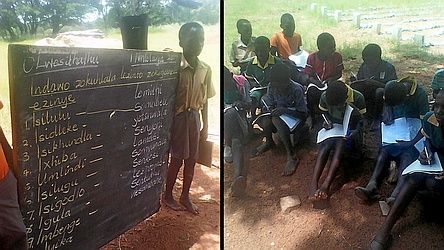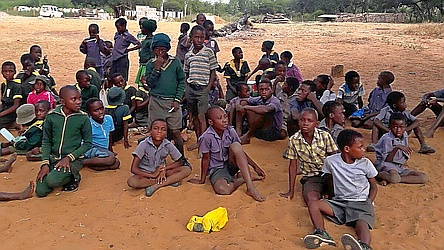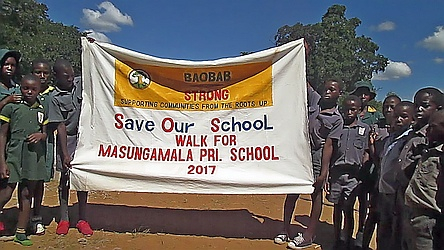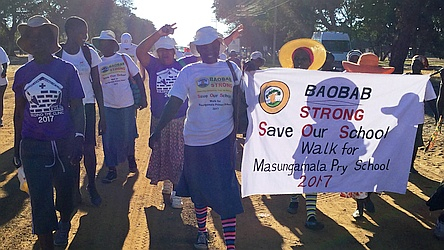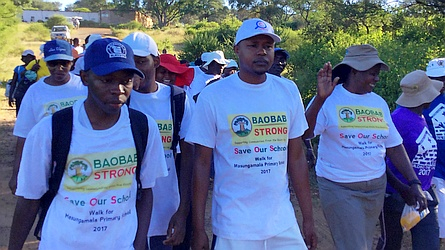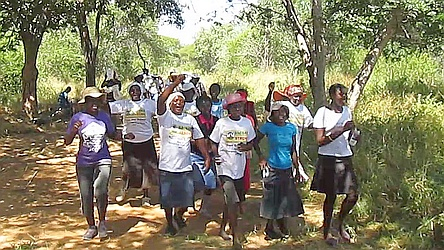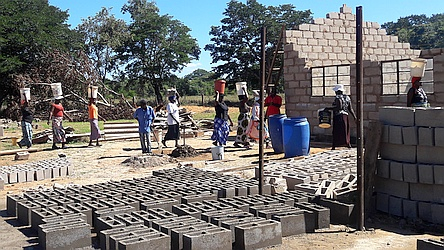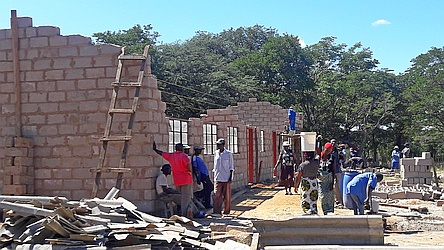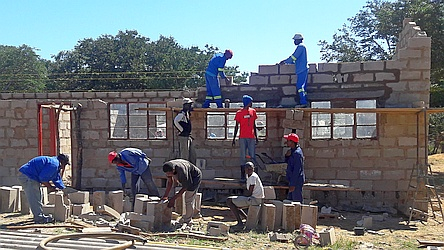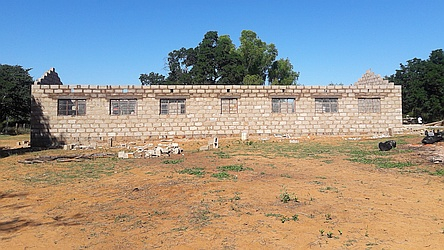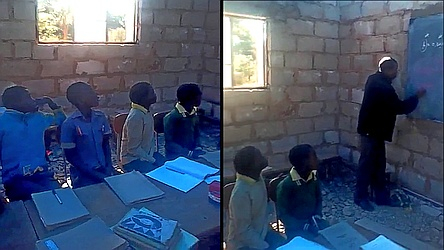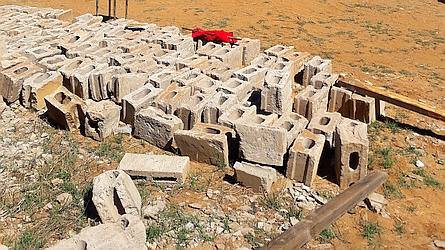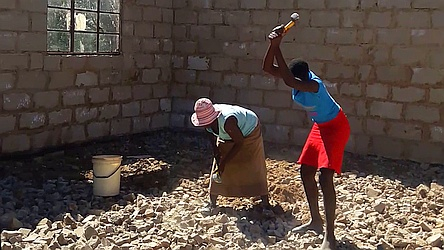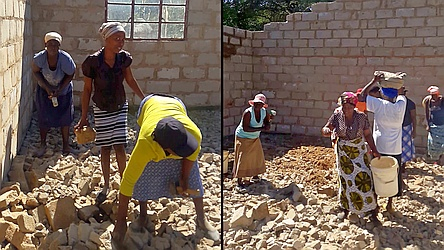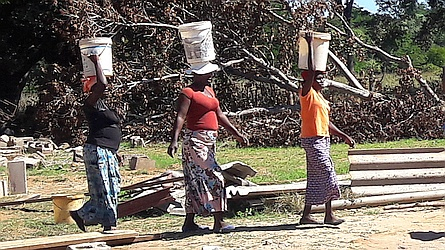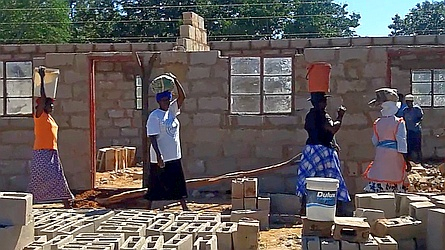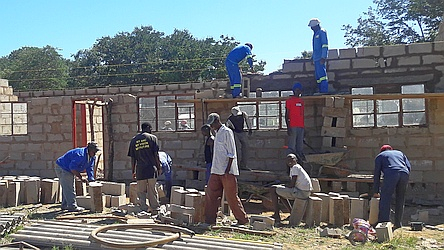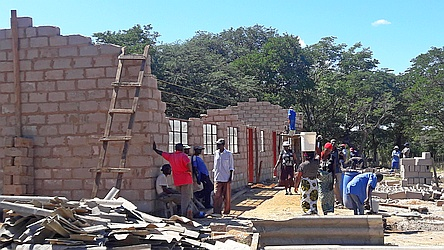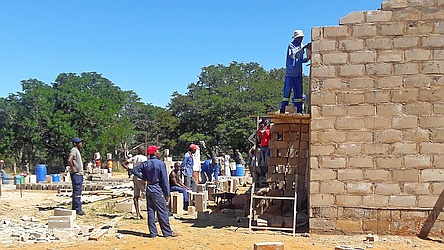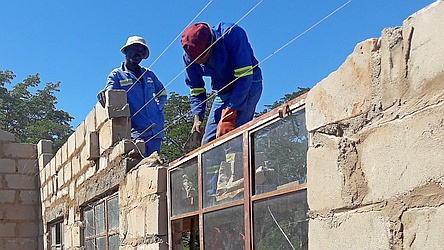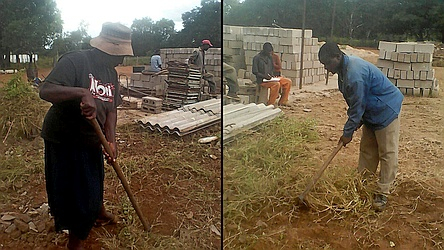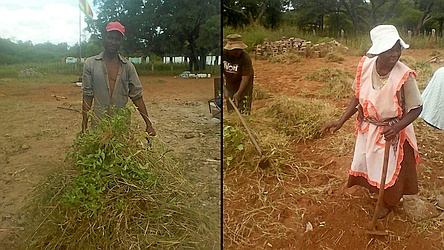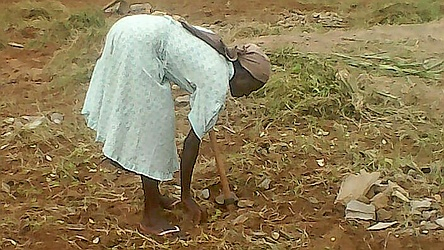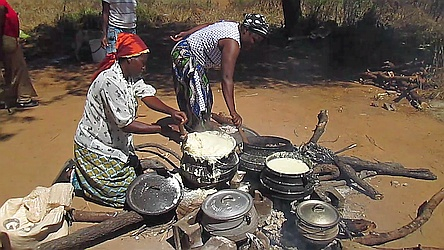History
The original school at Masungamala was built in 1952 to teach children to read and understand English, so they could later obtain local jobs. Over the years, the school slowly decayed and suffered major storm damage. In late 2016, out of safety concerns, the aged school had to be demolished. That left 200 students without a school building.
Yearning for an education, some students continued to attend classes, which were held outdoors beneath shade trees. But the trees offered little protection from the harsh elements. Attendance suffered greatly. The students and the whole community were in a desperate situation.

With BAOBAB STRONG’s core belief that education provides the best route for escaping poverty, we saw help was urgently needed for this impoverished African community. In response we created the “Save Our School” project. Its inaugural event occurred in April 2017, with a successful fundraising “Walk for Education” in rural Zimbabwe.
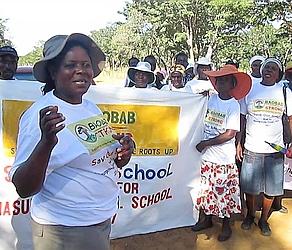
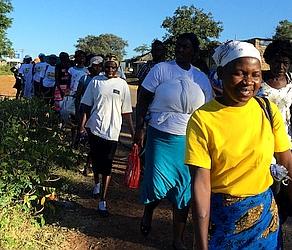
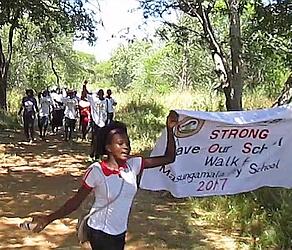
Read the exciting first-hand account of this “Walk for Education”.
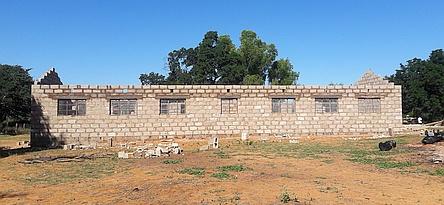
Strong donor support allowed construction to begin immediately on a brand new school building. The building is not yet finished, with only un-plastered walls and no roof. Yet, using a tarpaulin as a temporary roof, the new school building is currently being used for classes, and student attendance has greatly increased.
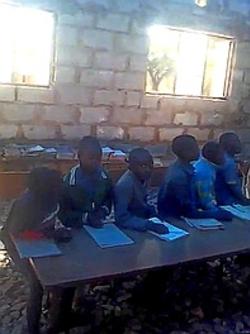
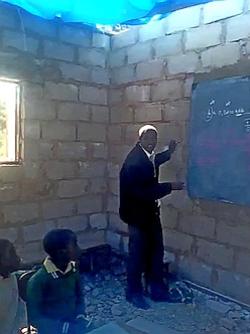
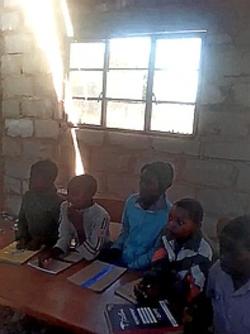
Witnessing what has been accomplished thus far; the local people have renewed faith in a brighter tomorrow. The “Walk for Education” and building efforts brought together and inspired the community, who became a crucial part of the solution.
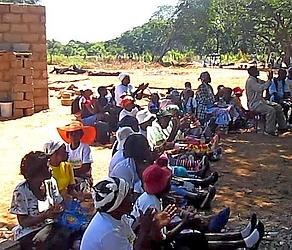
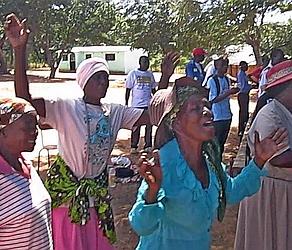
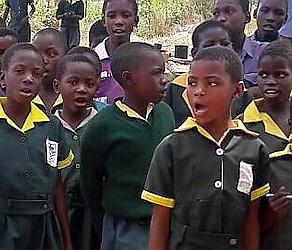
The local Masungamala community is highly appreciative and thanks the donors for the tremendous help they’ve provided. BAOBAB STRONG extends our sincere gratitude to donors who made this important work possible.

The “Save Our School” project offers ongoing support for Masungamala Primary School.
Goals for 2017
Finish building Masungamala Primary School: As of mid-2017, only the outer walls for the 2 classroom school building, called a “school block”, have been built. To complete the construction project, the following items are needed.
- Roof Truss and Roofing Panels – ($4000 total)
- Cement Floor and Wall Plastering – ($1650 total)
- Four Doors – ($140 total)
- Labor and Transport of materials – ($1500 total)
With your help, the school building can be completed quickly.
See how your donation is wisely used for the most impact.
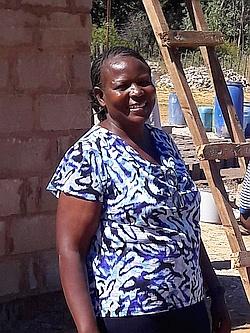
A Future Renewed
In April 2017, Catherine Gumbo of BAOBAB STRONG organized and led the “Walk for Education” in impoverished rural Zimbabwe. She tells her first-hand account of the successful and inspiring fundraising walk that has helped the Masungamala community build a desperately needed school. It was a personal and heart lifting journey for Catherine, who had lived in Masungamala as a child. On her quest, she returned to her roots, bringing the tools and inspiration to lead others on the path to escaping poverty.
Join Catherine on her African journey…
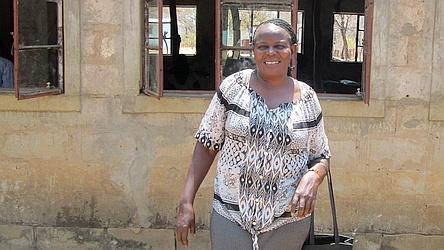
In the fall of 2016 with excited anticipation, BAOBAB STRONG Chairperson Catherine Gumbo visited Masungamala Primary School in an impoverished area of rural Zimbabwe. She was anxious to return to the childhood school where she had begun her education and her escape from a life of poverty.
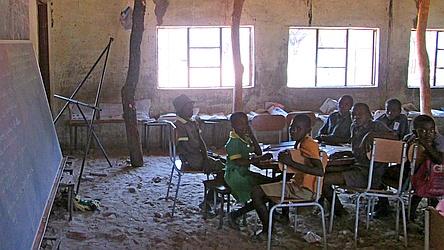
On arrival at Masungamala, Catherine was alarmed to find her old school building in a dilapidated and dangerous condition.
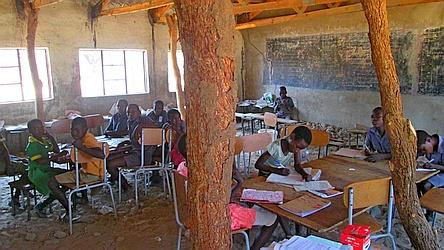
She feared the students might be severely injured if the propped up roof and decaying walls gave way.
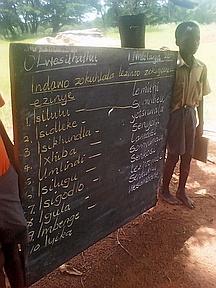
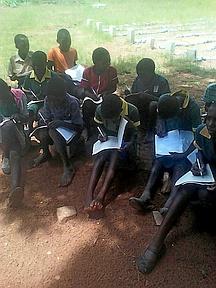
Three months later, a violent hailstorm battered the aged school. The building was damaged beyond repair, and had to be demolished. While children of Masungamala no longer had a school building, many continued to attend as classes were held outdoors under the trees.

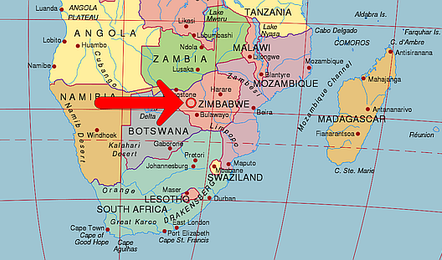
In response to the school’s collapse, BAOBAB STRONG created the “Save Our School” project, and organized a “Walk for Education” to take place in Zimbabwe with the goal of fundraising $5000 to help rebuild Masungamala Primary School. There was an outpouring of support from kind and generous donors wanting to ensure the children of Masungamala had a chance to be educated. And in April 2017, Catherine returned to Zimbabwe to inform the Masungamala community about the money raised, and to lead the “Save Our School” walk to Masungamala.
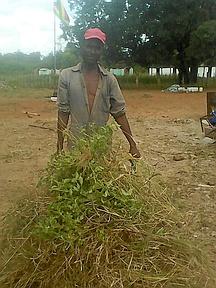
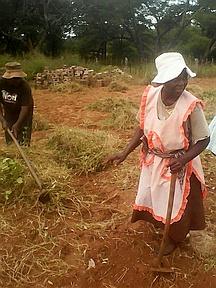
Catherine recalls her reception in the village.
I went with my brother Hezy to meet the villagers at Masungamala on the 5th of April, about a week before the walk. The only buildings at the school were a teacher’s cottage, a small hut used for storage, and 9 or 10 pit latrines outside the school fence. The ground where the collapsed school used to stand had been cleared and rubble was piled in 3 areas within the yard.
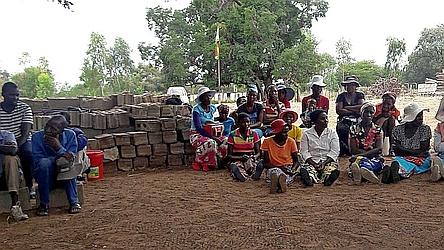
There was a crowd of about 100 people waiting to meet us. Women sat on the ground and men on some old bricks or logs. There were chairs reserved for us, members of the school development committee and the school’s headmaster.
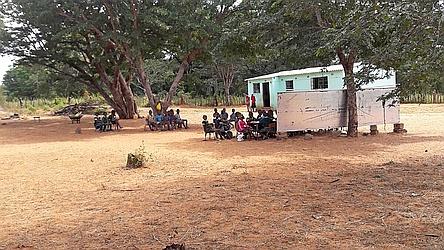
Students were attending class under a tree closer to the teacher’s cottage.
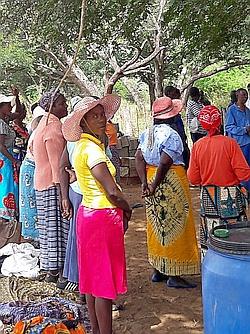
One lady, Mirriam, had the widest smile on her face as she gave me a hug. ‘We were in class together in this school from 1st to 5th grade,’ she said. I could not recognize her face but I remembered that name from more than 45 years ago. Then a man named Gedion also came to shake my hand with extreme enthusiasm. He said he was in the same class with my older brother by the same first name. Many villagers were happy to remind me who they were by telling me their family name or explaining where their homestead was located.
But since we had limited time, I politely excused myself and began to talk about purposes of BAOBAB STRONG and the upcoming sponsored walk. I announced the total amount that we had already raised for the walk, and informed everyone that a supplier was going to deliver materials so that construction could start right away.
The headmaster expressed how difficult it was for him to watch students trying to learn in those conditions. His voice was wavy and he indeed said he wanted to cry because of the situation he was in. The weather was harsh. It had been raining and windy most of the days since January. And on days when classes could be held, there was too much distraction from animals or people carrying on with their business. He was concerned that many students had stopped attending school after the school had collapsed.
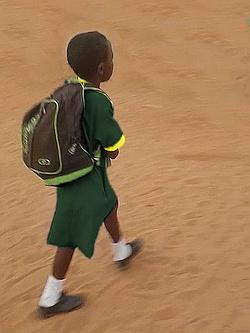
‘What kind of a future will these children have?’ he asked. Some parents had moved their children to neighboring schools. He was worried that those students were walking more than eight miles to get to school and since they left their homes very early when it was still dark, there was danger that wild animals such as elephants could attack them. We heard that elephants had attacked two people in the previous weeks.
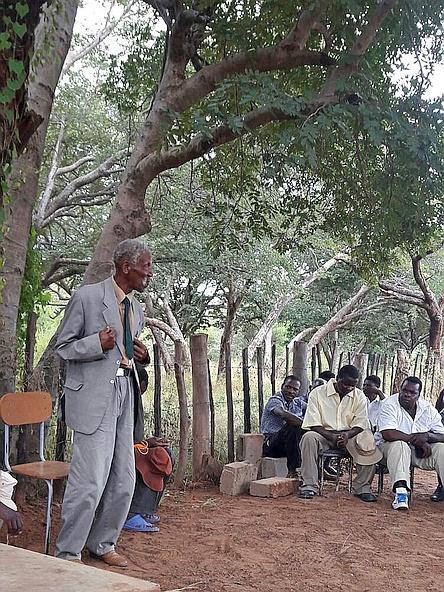
But the person that sticks out in my mind the most is an old man named Magagula. He must be in his late eighties or early nineties. He was wearing a grayish suit. I thought he was a Headman or some other community leader, but I later learnt that he had retired from a position in the District Council. As he stood up slowly, I wondered if he would be able to speak at all. Everyone quietly waited for him to speak and when he finally did, I was pleasantly surprised. I truly believe that he was the motivator that we needed to shake Masungamala community into unparalleled participation in this project.
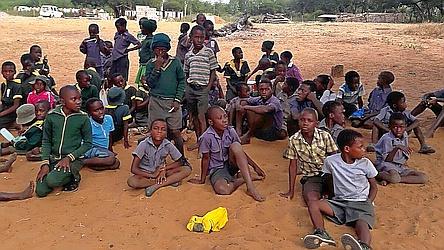
He told the crowd that he remembered my father very well. ‘Look at my daughter here,’ he said. ‘She has a big heart. She has returned to her home with this Baobab organization because she wants us to improve. It’s from here,’ he said, hitting the left side of his chest with his right hand to indicate location of the heart, ‘I know we don’t have money, but we can use whatever little we have to contribute towards rebuilding this school for our children and grandchildren’. And to the loud clapping and ululating, his eyes seemed to search out everyone in the crowd as he bellowed, ‘Let us search our hearts, I say. Let us search our hearts! Isn’t there something that each one of us can give to help these children?’
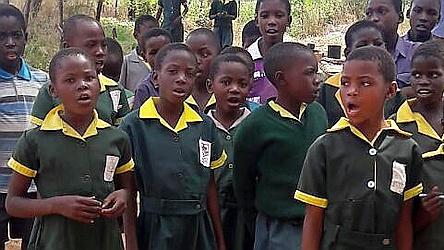
Everyone in the crowd seemed so focused on what Mr. Magagula was saying. I was so moved.
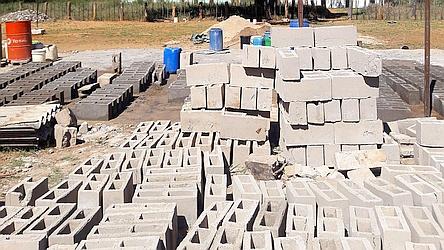
Construction materials were delivered before we left Masungamala. It was truly amazing to watch the excitement that a truckload of cement generated in this crowd. It was announced that construction was to begin the following Saturday and working groups were organized for each day. The labor was all by the locals, with the exception of three builders from Lupane.
The “Save Our School” walk was to begin in the town of Lupane, head west across the mighty Gwayi River, then trek into an impoverished area of rural Zimbabwe before ending in Masungamala.
Hiking in the remote African bush can be difficult and dangerous. The weather can be exceedingly harsh, the terrain challenging, with dangerous animals as potential hazards. Another possible challenge of the walk is crossing the treacherous Gwayi River, which is susceptible to flash flooding. The thought of crossing the river reminded Catherine of her grandmother and their experience crossing the same river when she was a child.
Catherine shared her thoughts.
Most of the older people of Masungamala remember my grandmother whose nickname was Mafatshi, which meant big drum. She was tall and heavyset with a very commanding voice. People used to gather in our home for her traditional dancing. One of her favorite songs was ‘Hayi Masungamala, Mayihlangane nje’ meaning ‘Masungamala must come together’.
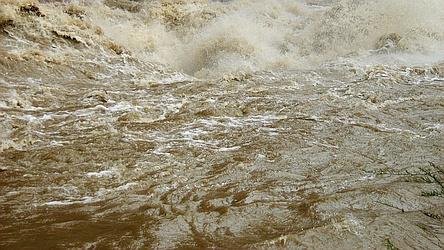
When I transferred from Masungamala to Lupane Primary School as a child, my grandmother found a local man who was known for helping people cross Gwayi River even when waters were high. This man instructed my grandmother to hold firmly onto a rope that he was holding on the other end and I was supposed to hold onto my grandmother’s clothing as he led us across the river. When we were somewhere in the middle, more water came at us. I remember so vividly feeling as if someone was removing the sand from under my feet each time I tried to make a step. The water was going so fast, my small feet were being swept away. My grandmother’s skirt began to tear away probably from the weight of the water. The water was all the way to my neck and the last I remember is my grandmother crying and saying ‘What will I tell Tauzen?’ Tauzen was my father’s first name. Somehow we made it across, I don’t remember how.
On the day of the “Save Our School” walk for Masungamala, Catherine learned that the old man in the grayish suit who had made such a compelling speech at Masungamala days earlier had since experienced his own bout with the river.
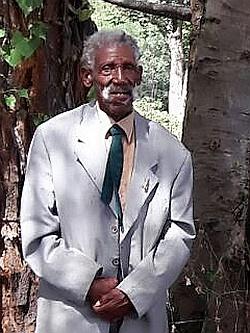
She relayed the story.
Unfortunately, I learnt the old man, Magagula, had almost drowned a few days before the walk. He tried to cross Gwayi River when it had a sizable amount of water flowing after two days of rain. Because there is no bridge for this stretch of the river, people have devised ways of crossing the river, which are not always successful. I was told that Mr. Magagula tied two cows together and drove them to cross the river as he held onto the rope that they were pulling. Midway into the river, the cows were separated by the strong waves and the water carried off Mr. Magagula. Luckily, he managed to hold onto a tree along the bank of the river and was rescued by some villagers who were waiting for the water to go down so they could cross. They took him to St. Luke hospital where he was recovering.
Despite the potential dangers of river crossing, enthusiasm for the walk remained high. The walk gave hope for students, teachers and the community that Masungamala Primary School would be rebuilt. More than 50 participants from the community and Lupane Rural District Council joined the walk.
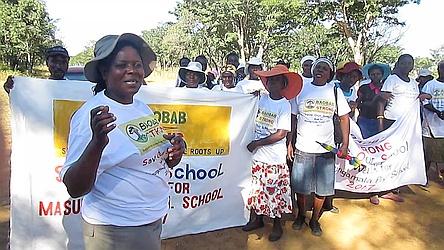
Catherine shared her experience.
On the day of the walk, we gathered in Lupane before 7 am. Villagers from Masungamala had hired a local truck to pick them up so they could come and start the walk with everyone else. Four people were holding two homemade BAOBAB STRONG banners with the “Walk for Masungamala” message.
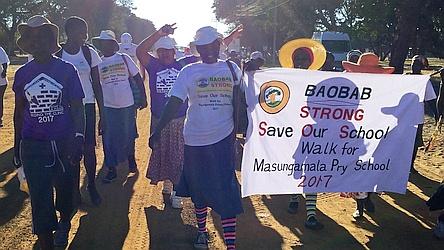
There was excitement in the air and we left Lupane singing.
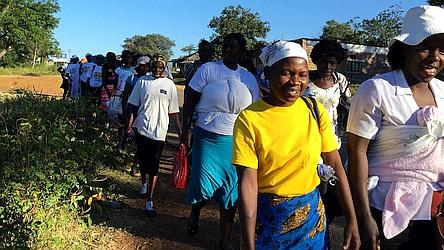
Two women from Masungamala who were carrying babies on their backs particularly touched me. Surprisingly they walked faster than me for the distance that they walked. They only got into the cars that were trailing the walkers when the babies started fussing. So did a few others who got too exhausted.
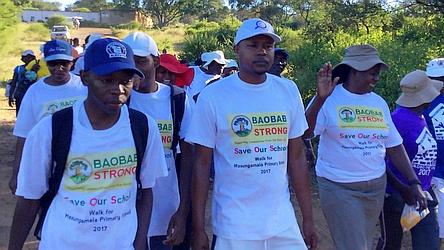
For most of the distance I was walking slowly behind everyone.
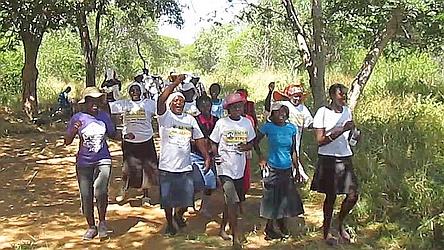
The sun was very hot. Where possible, the walkers followed paths through the shade of trees.
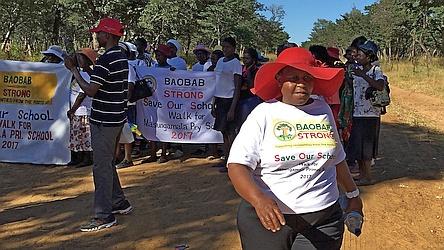
Nobuhle, in her big red hat, had it all together. The long walk was no problem for her. But I must have missed something on the preparation for the walk because I developed severe blisters on both feet. A few times I was tempted to get into one of the cars but my friend Eleanor and Mr. Ndebele challenged me to walk on. Besides, I really did not want to seem too weak to make it all the way.
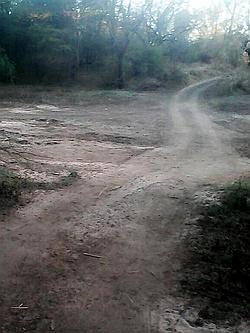
The dusty roads get muddy and impassable during the rains.
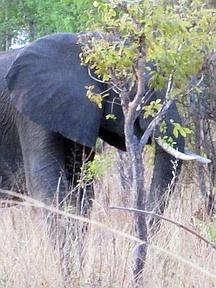
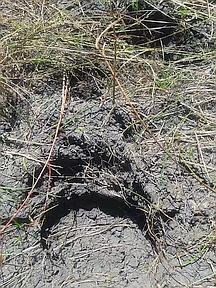
They had dried up during the walk but elephant footprints were making the road very uneven. In fact, at various times in the past, the road had been closed due to damage from roaming elephants. Mr. Ndebele told us that we would not even be able to see the elephants until they were very close due to the overgrown vegetation. Fortunately, the only scary animal encounter was when a snake slithered across the road in front of the walkers that were ahead of us.
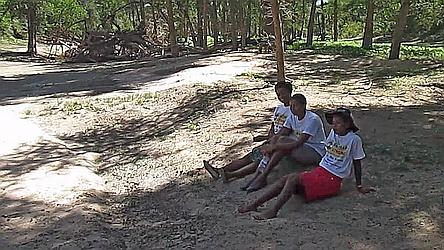
Close to the Gwayi River, the vegetation was thick, with a unique kind of weed that has orange flowers and grows as tall as the trees. Since the plan was for all the walkers to arrive at the school in one group, those ahead waited for us at a crossing point along the river.
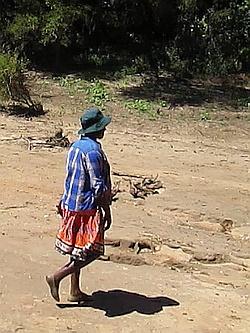
We were very relieved to find the river was mostly dry, except for a few areas of standing water.
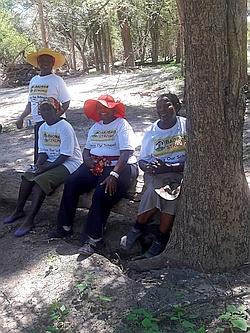
I was extremely tired and thirsty at that point. I wanted to just throw myself on the sand and rest for several hours. But, of course, I pretended to still have it all together. I sat on a dead log that must have been carried over by raging river waters and happily leaned against a tree for a while. Imagine, we had run out of water! My lips were beginning to stick together from dehydration. Fortunately Nobuhle was kind enough to share the little water that was left in her bottle. Rest by the river was definitely a lifesaver for me and I think a few others too.
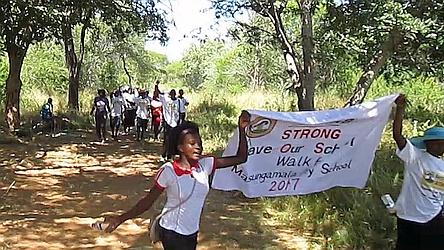
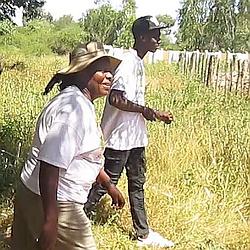
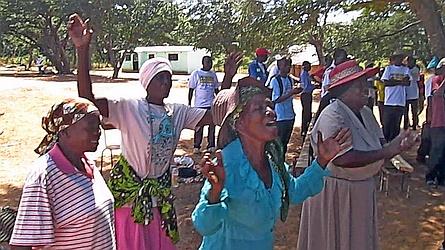
People were singing and dancing as we concluded our walk at Masungamala Primary School.
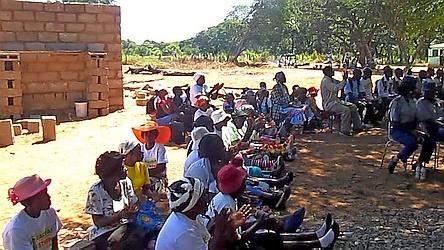
But being so tired, most of us went straight to the sitting area under the tree shade. We thought we were going to share our peanut butter and jelly sandwiches then get into cars and go back to Lupane. Instead, a well-organized celebration followed the walk.
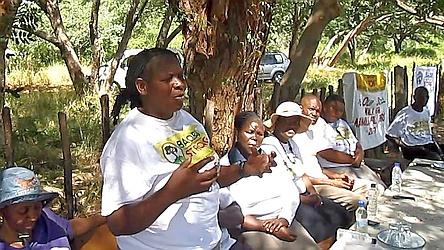
I was asked to talk briefly about BAOBAB STRONG and the sponsored walk. Afterwards, several speakers expressed gratitude for support that BAOBAB STRONG was giving.
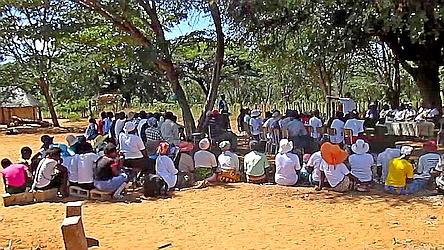
The headmaster gave another emotionally charged address. He said his hopes had been restored. ‘I cannot believe what I’m seeing,’ he said looking towards the school, whose walls had been built from ground to window level within 5 days.
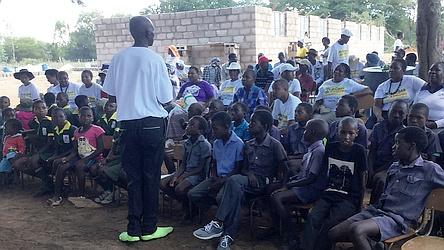
The School Development Committee chairperson jumped around like someone playing soccer and said people needed to see how happy he was. He said that something big had happened in Masungamala and he believed that even bigger things were yet to happen.
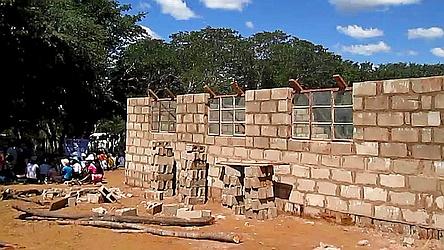
He pointed to the ground adjacent to the primary school and said, ‘I want to see a Secondary School built over there. We are going to do it! BAOBAB STRONG, you hear me? You have to support us’. The sponsored walk had generated overwhelming excitement and anticipation.
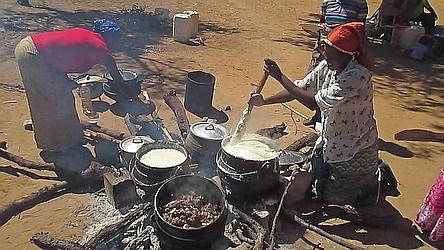
Though the local people do not have money to contribute to the school construction, many chose to support the cause by donating a chicken or bucket of dry corn. Food was served for everyone, and was comprised of meat from two goats, 15 chickens and Isitshwala made from cornmeal and prepared by a group of volunteers. School children were served first, then visitors, followed by men and women last.
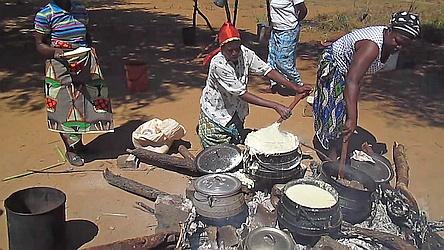
I felt a little uneasy because I thought food might run out before everyone ate. I asked the server to put less food on the plates, but was told not to worry because there was plenty of food. And there was.
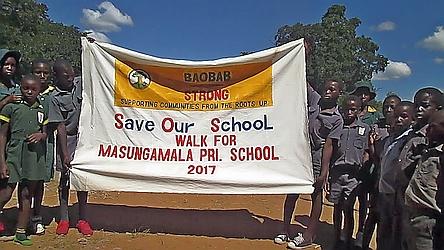
As I bid farewell, one group of women broke into a song, which when translated from our local language means ‘We don’t know what we can give you as a way of saying thank you’. I was very happy, but also guilty that I was the focus of such huge appreciation, yet people who gave the donations might never know the difference that they made in the Masungamala Community.

I can’t thank the BAOBAB
STRONG donors enough!
Catherine’s return to Masungamala Primary School had made a powerful impact on her 45 years after crossing the Gwayi River with her grandmother to continue her education. Finding her old school building in such disarray and its subsequent demise had been heartbreaking. But it was that return to her roots that initiated the BAOBAB STRONG fundraiser, inspired support from compassionate donors, drove collaboration of Masungamala community members and leaders, and led to building a new school for the children of her native village.
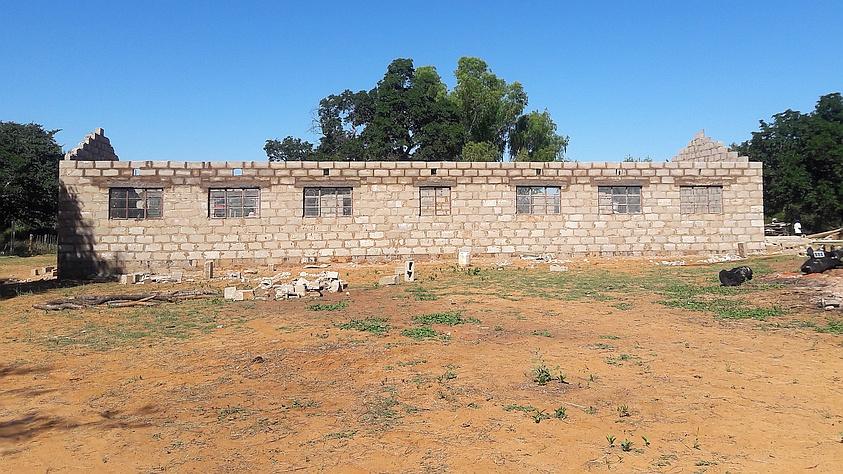
While the new Masungamala Primary School building is not yet complete, and still in need of a roof, a floor, and other components before the winter rains, the students and headmaster are happy to safely hold classes within the new structure. BAOBAB STRONG continues to support the school construction as donations are received.
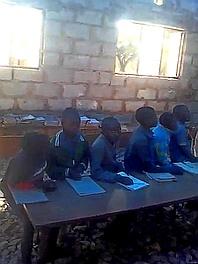
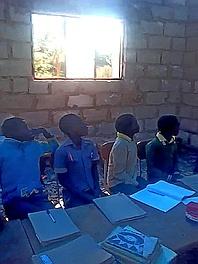
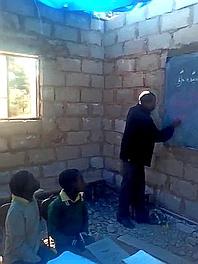
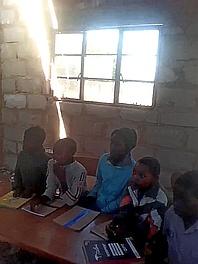
In the end, the most powerful impact of Catherine’s visit was the hope instilled in the children of Masungamala Primary School that they might receive an education, and one day travel across the Gwayi River as Catherine had, not only leaving behind a life of poverty, but also becoming a positive force in improving the lives of others.
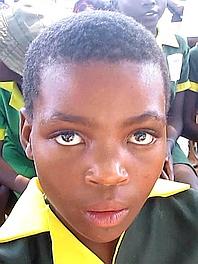
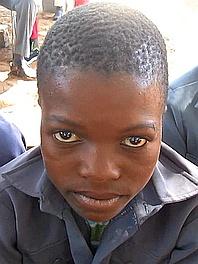
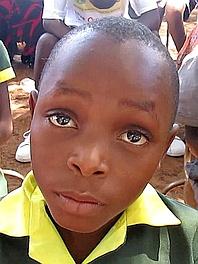
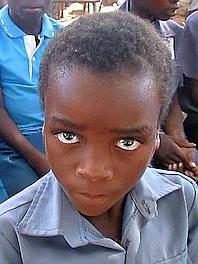
Stretching Donor Dollars
BAOBAB STRONG is a volunteer lead and operated organization that strongly believes in minimizing costs, to stretch every donated dollar, to produce the most impact for those in need.
For Masungamala Primary School, many bricks and materials reclaimed from the previously demolished old school building were reused. Local unemployed men and women were hired for the construction work. Avoiding the need for costly construction equipment, many jobs could be performed equally well with simple tools and human effort.
Not only were these measures more cost effective than having the project entirely handled by a building contractor, it offered much needed income to those living in the impoverished community, and taught the local people useful skills. Many people even volunteered to work, since they understood the importance of the project. In only 5 days, with about 50 local workers, and 3 experienced builders from Lupane, the area was cleared, and the walls of the two-room school building were erected.



